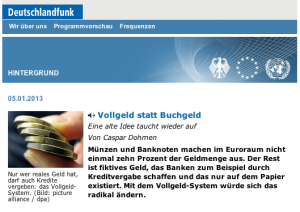Plain Money instead of Credit Money


The german national radio Deutschlandfunk has broadcasted on Sat 5th Jan a program that explained in detail the money creation, seigniorage as well as the reform proposals of our sister organization in Germany – Monetative (that are in line with Positive Money’s proposals).
A team of our volunteers – English expats in Switzerland – have made a brief English summary of this radio programme:
Professor Richard Werner is Chair for International Banking at the University of Southampton. During a recent stay in Frankfurt he confirmed that 84% of people still believe that money is produced by central banks or by the government although this is true for only 10% of the European money supply. When asked if they would approve of a system in which money is produced by private companies, 90% replied “No.”
Private banks create electronic credit money, and destroy it again when it’s repaid. The European Central Bank only has minor control over money supply, despite the popular view that control is accomplished by adjusting the base interest rate.
Sociologist and economist Professor Joseph Huber: “Despite the purported mechanism, control in fact resides with private banks. The current crises are a direct result of this.” He suggests a new system called Plain Money (also known as ‘Sovereign Money’). In this system, money is created independently and cannot vanish. The organisation promoting this idea in Germany is called “Monetative”.
Next to legislative, executive and judiciary, the “monetary” branch of the state would further enhance a separation of power from private institutions. Huber: “Independent control over money supply is essential for a stable economy.”
A growing number of Germans support this idea. It would at last separate the creation of money from the credit system. One way to put new money into circulation would be through a Citizen’s Income – a form of dividend. (An initiative for such a “basic income guarantee” is currently underway in Switzerland, independently of Plain Money reform – translator’s note.)
Plain Money breathes new life into ideas initially popularised by Irving Fisher at the height of the Great Depression. Michael Kumhof is one of the two IMF economists who crunched the numbers on this in 2012: “It could spawn real growth. And eliminate the threat of runs on banks.”
Huber: “Early on in the USA, a citizen’s dividend proved highly successful, only to be ultimately crushed by the British banking lobby – one cause of the War of Independence.”
In Switzerland, the organisation MoMo (“monetary modernisation”) promotes the idea of Plain Money, which enjoys broad support throughout the political spectrum. Huber: “If Switzerland lends its weight to Plain Money (Sovereign Money), people are less likely to feel it’s just another weird idea. It would be one sign that the concept has truly come of age.”
Please note: The quotes are condensed!
A journalist of Deutschlandfunk has visited the annual conference of Monetative in October 2012 in Berlin, and this is his report.If you speak German, you can listen to the full report here. And here you can now watch all the videos from the Monetative Conference.